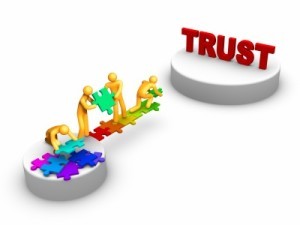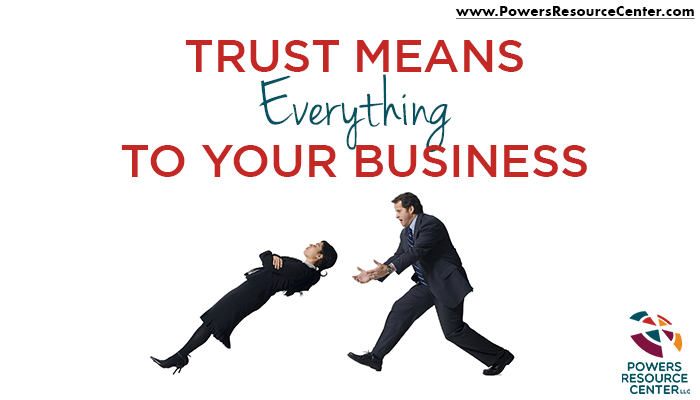by Tara Powers, MS
“Trust each other again and again. When the trust level gets high enough, people transcend apparent limits, discovering new and awesome abilities for which they were previously unaware.” – David Armistead

Everyone knows that it’s not easy to build trust, but it’s very easy to destroy it. Business trust is what creates a workplace where people hold themselves accountable. Whether a small business, family business, or in a large corporation, trust creates a workplace where information is shared freely and openly, silos are non-existent, and people are involved in designing their own jobs and creating systems to do their jobs to the best of their ability. Trust is about sharing information, caring about other roles, opening yourself up to constructive feedback, communicating with integrity, asking for what you need, and providing support even when it’s not your job. You don’t need a study from Harvard Business Review to tell you that trust is a key element of your business assets and business interests.
So HOW do you build trust? Here are ten ideas you can put to use immediately:
- Managers act more as mentors and coaches rather then task masters.
- Share leadership on the team.
- Provide ongoing feedback on progress and business structure.
- Read just meetings to create more openness, sharing of feedback, creative thinking and risk taking.
- Share ideas with the team or with an individual on what needs to be done and then ask for voluntary participation to make it happen.
- Encourage team members to share mistakes so that everyone can learn from it. Make this a key part of your business practices.
- Use a problem solving and decision making process that everyone can follow individually and as a group.
Example: Gather data, analyze data, identify issues, decide on solutions, implement solutions, analyze results, start process over if necessary. - Encourage each team member to share their personal vision for their role.
- Ask team members to serve their internal and external customers as they would like to be served. Then trust them to do the right thing.
- Have frequent discussions as a team what it would look like to appreciate one another, put others first, openly communicate, etc.
Next Steps to Build Trust
As you review this list consider if your corporate culture imposes more authority and control or operates from a high level of trust where people are free to do their jobs to the best of their ability. Whether you are a small business or a large corporation, trust is foundational to success. What would it take to begin trusting your team to do the right thing? What would need to shift to make this happen? Focus on one idea listed in this article each month to improve the level of business trust on your team and expect amazing results.
Encourage your employees to take stock of what they’ve created this year. Encourage them to think about what they would like to see happen for themselves, their team, and the company next year. Ask them to ponder one small shift they might make in their life that could bring them more joy, peace and happiness. Ask them to ponder one small shift the company could make that could bring more joy, peace and happiness to your workforce. How could the business leaders cultivate more business trust? Asking questions like these is foundational to your business practices.
These are important conversations that build a foundation of trust with your employees. They demonstrate a level of caring and show that you are interested in them and their aspirations. More importantly they will begin building trust that you truly have their best interest at heart.
As I’ve learned through my experiences working with various leaders and teams, trust is indeed the denominator of efficiency. It’s the catalyst that transforms the mundane into the extraordinary, pushing individuals and organizations beyond their apparent limits. When trust flourishes, teams transcend their preconceived boundaries and unlock new, remarkable abilities they were previously unaware of. Building trust within your organization is not an easy task, but it’s crucial for long-term success. Trust creates an environment where individuals hold themselves accountable and share information freely. It eradicates silos, empowers people to shape their roles and systems, and fosters a culture of integrity, constructive feedback, and support. Trust is not merely an intangible concept; it’s a tangible asset that directly impacts your business’s interests and prospects. So, invest in trust, encourage mentorship and leadership sharing, promote open communication, embrace mistakes as learning opportunities, and continuously seek to appreciate and empower your team. By doing so, you’ll embark on a journey that will undoubtedly lead to remarkable results.
Related Posts
-
5 Advantages of Managing Business Ethics
Nearly 20% of Harvard's 2009 MBA class signed the MBA Oath which states that they will act responsibly, ethically and for the greater good of society rather than striving for only their personal ambitions. At Columbia Business School, all students pledge to honor a code…
-
5 Advantages of Managing Business Ethics
Nearly 20% of Harvard's 2009 MBA class signed the MBA Oath which states that they will act responsibly, ethically and for the greater good of society rather than striving for only their personal ambitions. At Columbia Business School, all students pledge to honor a code…
-
5 Advantages of Managing Business Ethics
Nearly 20% of Harvard's 2009 MBA class signed the MBA Oath which states that they will act responsibly, ethically and for the greater good of society rather than striving for only their personal ambitions. At Columbia Business School, all students pledge to honor a code…





